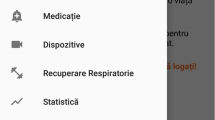Abstract
The quality of asthma control plays a vital role in the asthma self-management to find out how well the asthma symptoms have been controlled. A measuring tool often implemented to determine the condition is Asthma Control Test, or for short, ACT. In this modern digital era, developing the ACT to be a smartphone app seems like a good idea. In Indonesia, however, it is still relatively new and not yet popular. Therefore, the main objective of this study was to determine variables of perceived usefulness variables and perceived ease of use variables in user acceptance variables of the ACT app. This study applied an explanatory method with a quantitative approach. The participants of study were asthmatics with the following criteria: aged 19–22 years old, having a history of asthma, and having installed and run the ACT app for four weeks. A purposive sampling model was adopted with 100 participants, and the instruments included ACT app and a Technology Acceptance Model questionnaire. Additionally, a descriptive statistic method was employed with the use of multiple linear regression to prove the study hypotheses. The findings confirmed that both variables had a positive and significant effect on user acceptance variables with a significant value of 0.02 and 0.01, respectively. In conclusion, the app provided benefits and convenience for its users. Therefore, the app was accepted as an alternative medium to assess the quality of asthma control in the last four weeks.





Similar content being viewed by others
References
Barutçu DS, Barutçu E, Adigüzel DÜ. A Technology Acceptance Analysis for mHealth Apps: The Case of Turkey. :10.
Davis FD (1989) Perceived Usefulness, Perceived Ease of Use, and User Acceptance of Information Technology. MIS Q 13(3):319–340
Dou K, Yu P, Deng N, Liu F, Guan Y, Li Z, Ji Y, Du N, Lu X, Duan H (2017) Patients’ Acceptance of Smartphone Health Technology for Chronic Disease Management A Theoretical Model and Empirical Test. JMIR Mhealth Uhealth 5(12):e7886
Gance-Cleveland B, Leiferman J, Aldrich H, Nodine P, Anderson J, Nacht A, Martin J, Carrington S, Ozkaynak M (2019) Using the Technology Acceptance Model to Develop StartSmart: mHealth for Screening, Brief Intervention, and Referral for Risk and Protective Factors in Pregnancy. J Midwifery Womens Health 64(5):630–640
Ghozali MT, Satibi IZ, Lazuardi L (2021) Exploring intention to use Asma Droid app of Indonesian Asthmatics using Technology acceptance model (TAM): A Descriptive Quantitative Study. Res J Pharm Technol 14(1):573–578
Jia CE, Zhang HP, Lv Y, Liang R, Jiang YQ, Powell H, Fu JJ, Wang L, Gibson PG, Wang G (2013) The Asthma Control Test and Asthma Control Questionnaire for assessing asthma control: Systematic review and meta-analysis. J Allergy Clin Immunol 131(3):695–703
Li J, Ma Q, Chan AH, Man SS (2019) Health monitoring through wearable technologies for older adults: Smart wearables acceptance model. Appl Ergon 75:162–169
Mukhopadhyay S, Basak R, Carpenter D, Reithel BJ (2019) Patient use of online medical records: an application of technology acceptance framework. Infor Comput Security 28(1):97–115
Nathan RA, Sorkness CA, Kosinski M, Schatz M, Li JT, Marcus P, Murray JJ, Pendergraft TB (2004) Development of the asthma control test: a survey for assessing asthma control. J Allergy Clin Immunol 113(1):59–65
Park DY 2019 A Theoretically Informed mHealth Intervention to Improve Medication Adherence by Adults with Chronic Conditions: Technology Acceptance Model-Based Smartphone Medication Reminder App Training Session. Indiana University-Purdue University Indianapolis;
Schatz M, Sorkness CA, Li JT, Marcus P, Murray JJ, Nathan RA, Kosinski M, Pendergraft TB, Jhingran P (2006) Asthma Control Test: reliability, validity, and responsiveness in patients not previously followed by asthma specialists. J Allergy Clin Immunol 117(3):549–556
Yan M, Or C (2018) Factors in the 4-week Acceptance of a Computer-Based, Chronic Disease Self-Monitoring System in Patients with Type 2 Diabetes Mellitus and/or Hypertension. Telemed J E Health 24(2):121–129
Funding
No funding to declare.
Author information
Authors and Affiliations
Corresponding author
Ethics declarations
Conflict of interest
The authors declare that they have no conflict of interest and all ethical issues including human or animal participation has been done. No such consent is applicable.
Additional information
Publisher's Note
Springer Nature remains neutral with regard to jurisdictional claims in published maps and institutional affiliations.
Rights and permissions
About this article
Cite this article
Ghozali, M.T., Dewi, P.E.N. & Trisnawati Implementing the technology acceptance model to examine user acceptance of the asthma control test app. Int J Syst Assur Eng Manag 13 (Suppl 1), 742–750 (2022). https://doi.org/10.1007/s13198-021-01606-w
Received:
Revised:
Accepted:
Published:
Issue Date:
DOI: https://doi.org/10.1007/s13198-021-01606-w




